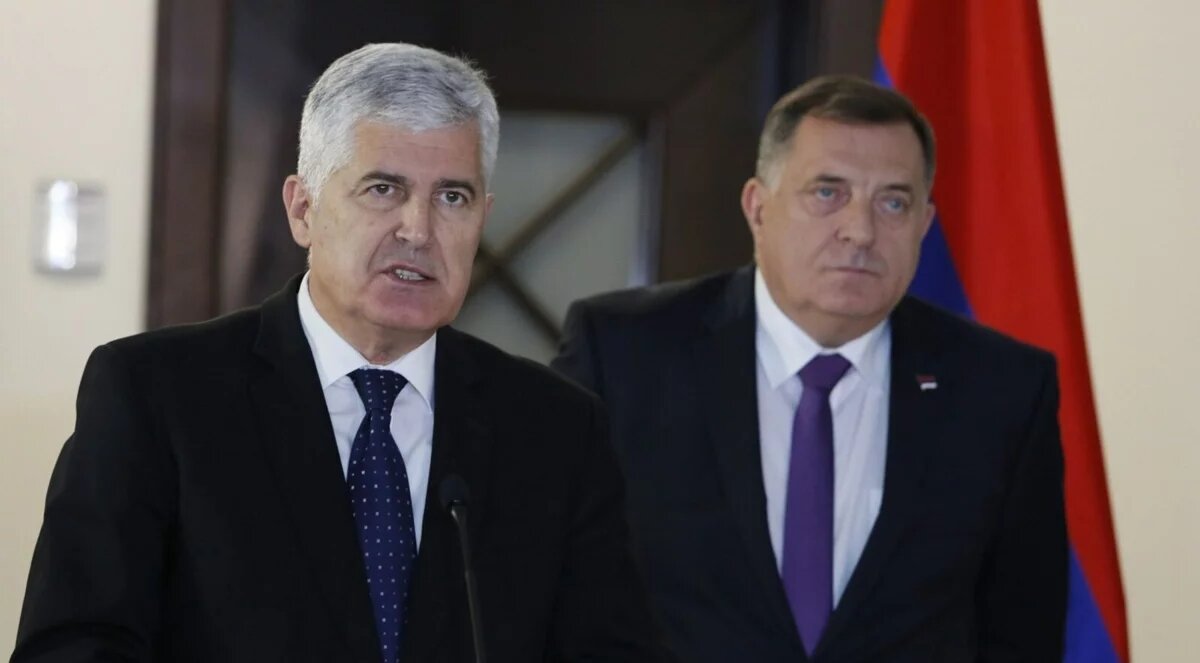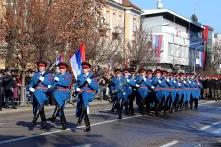The Russian invasion of Ukraine will bring flashbacks to millions of people in Bosnia and Herzegovina, Croatia, and Kosovo, who have all suffered massively under the regime of Serbian dictator Slobodan Milošević. In April 1992, Serb nationalists waged a war on my home country under a similar pretext as Putin did with Ukraine, denying its statehood, history, and national identity. Today, Bosnia and Herzegovina is in the worst crisis since the end of the war. Instead of empowering ordinary citizens and progressive parties within the country, the EU has sided with Russian proxies deepening the ethnic rifts, dismantling the country, and risking a new war.

In the early morning of February 24, I woke up to a message from my Kyiv-based friend Alina. "It has started", Alina wrote laconically. My mum was already following the news from Ukraine, feeling re-traumatized by what she saw on TV. "I know how Alina feels. I was her age when the aggression on Bosnia started", she whispered with eyes full of tears.
The Russian invasion of Ukraine will bring flashbacks to millions of people in Bosnia and Herzegovina, Croatia, and Kosovo, who have all suffered massively under the regime of Serbian dictator Slobodan Milošević. In April 1992, Milošević attacked my home country, Bosnia and Herzegovina under a similar pretext as Putin did with Ukraine, denying its statehood, history, and national identity.
Today, Bosnia and Herzegovina is going through its worst crisis since the Dayton Peace Agreement was reached in 1995 to end the war that cost more than 100.000 lives. My mum and her friends tell me anxiously that the red flags they saw in Bosnia during the late 80s and early 90s are clearly visible again. Unlike three decades ago, those wanting to dismantle Bosnia and Herzegovina are not aided only by the usual suspect, Serbia, but backed also by neighbouring Croatia, an EU member state, a well as Putin’s Russia.
United in division
One of the staunchest Putin’s supporters in the Balkans is the Bosnian Serb secessionist Milorad Dodik. Dodik, who currently serves as the Serb member of Bosnia's tripartite presidency, has made regular threats to secede the Republika Srpska entity from the rest of Bosnia and Herzegovina. He has been continuously engaging in nationalist rhetoric, anti-Muslim hatemongering, and denial of both Bosnian and Bosniak identity.
Most recently, during the European Parliament's Committee on Foreign Affairs (AFET) meeting on the political situation in Bosnia and Herzegovina, Milorad Dodik kept referring to Bosniaks as "Muslims", blaming them for wanting to create an "Islamic state" in Europe. He went so far to accuse the Members of European Parliament (MEPs) for not opposing the „Bosnian Islamic state“ in the same way as the European Union is fighting the ISIS. For Dodik, a vocal genocide denier, being a Bosniak is reduced to being a Muslim, and being Muslim equals to being a terrorist.
In his Islamophobic rant, Dodik was not alone. During the same meeting in Brussels, the president of the Croatian Democratic Union of Bosnia and Herzegovina (HDZ BiH), Dragan Čović joined Dodik in blaming Bosniaks for trying to establish "a unitary Islamic state". Over the years, similar accusations came from the headquarters of the Croatian Democratic Union in Zagreb. Its satellite party in Bosnia and Herzegovina, ran by Čović, joined forces with Serb nationalists in blaming Bosniaks for “unitarism”, Islamic fundamentalism, and even terrorism.
A similar campaign of hate served as a prelude to the Srebrenica genocide and other heinous war crimes committed by the Bosnian Serb forces during the war. For more than 15 years, Dodik and his enablers have been using divisive rhetoric to underpin their claims that Bosnia and Herzegovina is an „impossible state“. By doing so, Bosnian Serb separatists are pushing to cut ties with the central government, laying the groundwork for independence or union with neighbouring Serbia.
Second-class citizens in their own country
Milorad Dodik is not only talking about secession. Recently encouraged by Čović, he made concrete steps towards dismantling Bosnia and Herzegovina as we know it. Last December, the Republika Srpska National Assembly voted to pull out from Bosnia’s joint Armed Forces, secret service, tax administration, and top judiciary body. Not even two months later, in February this year, the lawmakers in Republika Srpska entity passed a draft law that would create a parallel institution challenging the authority of the Bosnian state’s top judiciary body. By the time this law was passed, the Republika Srpska authorities formed an entity-level agency for medicinal products and medical devices, contesting the powers of state Agency for Pharmaceuticals and Medical Devices.
In the midst of that crisis, Dragan Čović travelled to Banja Luka only to attend the special session of the Republika Srpska National Assembly and call for “protection of the Republika Srpska”. Many argued that Čović’s plea to ”protect Republika Srpska” is an insult to Croats killed and expelled by the Bosnian Serb forces in 1992 from today’s territory of the Republika Srpska.
The reactions to Dodik’s and Čović’s joint efforts to block Bosnia’s state institutions and cripple the country were bleak. Neither did the relevant state judiciary institutions nor the international High Representative, German diplomat Christian Schmidt, properly react in defence of the Dayton Peace Agreement. Statements expressing “grave concern” and condemning “inflammatory rhetoric” became part of widespread jokes shared on the social media. Meanwhile, more constructive reactions came from certain MEPs.
The Greens/EFA MEP Thomas Waitz called for Christian Schmidt to sack the Bosnian Serb strongman from the position of the Member of Bosnia’s tripartite Presidency. Other MEPs, such as the Chairman of the Delegation of the European Parliament for Cooperation with Bosnia and Kosovo, Romeo Franz slammed the EU’s appeasement policy towards Dodik and Čović. Franz especially criticized the proposal to amend the election law without implementing the European Court of Human Rights (ECHR) verdicts first, an endeavour undertaken by Dragan Čović and Croatian MEPs in Brussels.
Amending the election law without implementing the ECHR verdicts first would further damage the fragile credibility of the EU, which has been already harmed by the poor performance of the EU senior officials in charge of the process. Bosnia’s civil rights champion Azra Zornić, who was found by the ECHR to have been discriminated against, called out the top EU negotiator, Angelina Eichhorst for facilitating the election law negotiation talks in a non-transparent environment, excluding civic parties out of the process, and ignoring the ECHR judgements.
Dragan Čović, who has been advocating for a change of the electoral law without implementing the ECHR judgements first, threatened that without an agreement on electoral changes, Croat parties would boycott the general elections in October. At the same time, the rights of Jews, Roma, as well as those who declare as “Bosnians” or simply “citizens”, such as Ms Zornić, are being neglected in this process. Even though the ECHR ruled that the constitution of Bosnia and Herzegovina violated their rights to run for public office, they are still de facto second-class citizens in their own country. Such political dissonance is music to Dodik’s ears and a precious manoeuvring space for Russia.
“Champion of EU integration” against the EU sanctions
Since the start of the Russian invasion of Ukraine, Milorad Dodik did everything he could to prevent Bosnia and Herzegovina from imposing sanctions against Kremlin. Currently, Bosnia and Herzegovina is also one of the few countries in Europe which has not imposed sanctions against Russia. In an attempt to sabotage Bosnia and Herzegovina from condemning Russia’s invasion of Ukraine in UN Security Council, Dodik sent a letter to UN Secretary-General Antonio Guterres through the Russian ambassador to UN.
In his letter, Dodik argued that the Bosnian ambassador to UN, Sven Alkalaj has no right to cast the vote on the resolution because the BiH Presidency had not agreed a joint stance on the matter. “Bosnia and Herzegovina is to be impartial and neutral, and not in support of any particular side in this conflict”, Dodik wrote in the letter. However, Alkalaj voted in favour of the UN resolution condemning the Russian aggression against Ukraine together with all other Balkan states, including Serbia.
Such siding with Russia provoked fierce response not only in Bosnia and Herzegovina, but also in the EU. During the AFET meeting on the political situation in Bosnia and Herzegovina, a proactive Greens/EFA MEP, Tineke Strik lambasted Dodik for his pro-Putin stance. Strik invited Dodik to condemn Russian aggression, warning her colleagues that Dodik’s current position is a direct threat to peace and stability in the whole Western Balkan region. “If not [condemning the invasion], you should no longer be in office endangering the country and citizens”, the Dutch MEP told Dodik during the AFET meeting in Brussels. Strik specifically invited Dragan Čović to distance himself from Dodik in case he fails to condemn the injustice and violence done to the people of Ukraine.
Not even two weeks after Strik’s invitation to Čović, he decided to do the exact opposite. During a vote in BiH Parliament, Dragan Čović and his HDZ BiH joined the pro-Russian Bosnian Serb lawmakers and voted against Bosnia and Herzegovina sanctioning Russia and aligning its foreign and security policy with that of the EU. This particular vote in BiH Parliament was a clear proof that Milorad Dodik is not the only major Russian proxy in Bosnia and Herzegovina.
Supporting Putin in the midst of the Russian invasion does not look bad only for Čović, but also for those proclaiming him not an EU-oriented political role model. Over the years, Čović has been receiving support from EU Delegation to Bosnia and Herzegovina. In April 2020, EU ambassador to Bosnia and Herzegovina, Johann Sattler thanked [sic] Čović for acting as a "champion of EU integration". Sattler’s praise did not age well as the leader of the most influential Bosnian Croat party in the country failed to act as a true follower of EU values and policies.
This was not the first time Dragan Čović openly supported Russia. Back in February 2020, he travelled to Moscow to meet with high-ranking Russian officials. During the visit, in an interview with Rossiyska Gazeta, he praised the role of Russia in solving international disputes and stressed that “unfortunately, there is very little Russian influence in Bosnia and Herzegovina.”
Puppet master
In reality, malign Russian influence in Bosnia and Herzegovina is more than palpable. The Russian ambassador to Bosnia and Herzegovina, Igor Kalbukhov recently threatened Bosnia and Herzegovina with Ukrainian scenario in case the country decides to join NATO.
“If Bosnia and Herzegovina decides to be a member of any alliance, that is an internal matter. Our response is a different matter. The example of Ukraine show what we expect”, Kalbukhov told the FTV public broadcaster. Asked in a separate interview for FACE TV about why Russia is not bothered by Bosnia’s neighbouring countries which are part of NATO, ambassador Kalbukhov responded with “How do you know we have no plans against Croatia, Poland, Bulgaria, and other NATO member states?”
Such threats cause fear of a new war in a country where Russian proxies are strengthening the alliance and holding the country’s institutions paralyzed. In an interview for Politicki.ba, MEP Michael Gahler acknowledged the danger coming from Dodik and Čović, but underlined it is not them pulling the strings of destabilization and a potential war. “Putin is the puppet master. Any other assessment of the situation would be completely naïve”, German MEP said.
By pointing out the primary threat to peace and security of Bosnia and Herzegovina does not come from within the country, Gahler is rightfully sounding alarm over a far greater threat looming from the person responsible for killing children, bombing university buildings, and shelling maternity hospitals and kindergartens all over Ukraine. What we do not need foreign diplomats to point out for us are the patterns the generation of my parents observed more than 30 years ago and my Ukrainian friend during the last decade.
The aggression against Bosnia and Herzegovina has thought us that country's history and national heritage can not be destroyed despite the tyrants' aspirations to annihilate it. One of the most vivid examples is Sarajevo’s iconic City Hall, hit by a mortar and burned down during the Bosnian Serb siege of the city in August 1992. On the same day as the Russian forces attacked Ukraine, almost 30 years after if got burnt down, the Sarajevo City Hall was illuminated in the colours of the Ukrainian flag expressing solidarity with the people of Ukraine.
Today, Ukrainians are going through the darkest moments of their lives. However, this is not only an assault on Ukraine, but a blatant attack on civilization. The duty of my generation is to protect the civilizational values in Bosnia and Herzegovina, Ukraine, and elsewhere by preventing illiberalism to thrive. As the late Congressman Tom Lantos famously said, “the veneer of civilization is paper-thin. We are its guardians, and we can never rest.”


